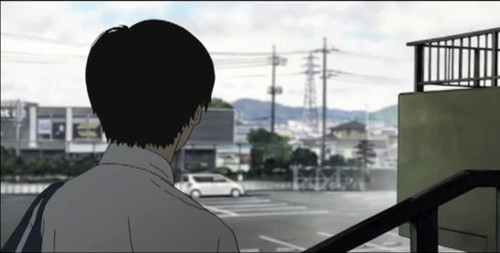Spring and the Flower Possessions
This is a quick-and-dirty English translation of a contemporary fantasy
setting idea originally posted to
Pixiv
in Japanese by @thykgn. I’m doing this
because it’s necessary background for a separate Pixiv comic that I’m
looking to do a translation of on Danbooru.
I do apologize in advance for how stupid some of the phrasings sound;
that’s entirely my fault, not the original author’s.
Continue reading

– under the cherry tree, a dead body lay buried.
Setting
Contemporary fantasy.
The world has a little more greenery than it does now. This is a story
of the flowers who seek the best fertilizer, so that flowers more
beautiful than any other may blossom; and the people who abandon their
remaining lives in order to obtain something greater.
After tree-planting was instituted into law, “enhanced” plants began to
appear, and competition for survival among the various flowers turned
fierce. At that point, the powerful abilities that the flowers held
inside them began to manifest – the flowers tempted humans in despair
with this exchange: In return for allowing one’s remaining human life
and body to be taken, they would receive the power to satisfy one
final wish through their connection to the flowers. The world’s flowers
became ever more brilliant and beautiful, but people thought of it as
merely the result of the earlier “enhancements.” Nor did anyone realize
what was causing the increased number of human disappearances.
The title mentions “spring,” but this setting can be used in any place
or season.
If you upload drawings or other images to Pixiv, I’d be happy if you
could tag them with “Spring and the Flower Possessions”
(春と花憑き).
Please send anything else to @thykgn.
The logo’s not all that fancy, but feel free to use it as you wish.
I got some questions about this: I don’t plan on doing further work on
this on Pixiv for the time being (neither for a project, nor for the
characters and setting), so feel free to put up character and setting
drafts and contributions!
Character types
-
Possessed: Those who have been taken by the flowers. In exchange
for offering their remaining lives and their bodies, they have been
given one exceptional ability. Their bodies crumble like ash after
their sacrifice, and become nourishment for the flowers, while the
possessed themselves become like ghosts. A flower either grows from,
or replaces a part of, their body. The flower starts out as
something foreign, but after a short time can become like part of
the body. The possessed cannot stray more than a few meters from the
plant that has power over them, and should the plant wither they too
will die. Flowers of annuals are short-lived, and therefore grant
extraordinarily strong powers; if the possessor is a perennial, the
possessed may hibernate during the winter, thereby extending their
lives. Flowers of trees are longer-lived, and therefore only grant
weaker powers.
-
Protectors: Those who protect flowers. Each has his or her own
reason for doing so. There is no penalty for allowing a flower under
one’s protection to die. On the other hand, there is no real benefit
to protectors, even if they accompany a possessed person until his
or her wish can be granted. They may borrow powers from possessed
people with deeply-rooted greenery. Unlike the possessed, they may
separate from their plants, and can even still use their powers;
however, their powers grow weaker with distance. When using their
powers, tattoos in the form of flowers appear on their bodies.
-
Devourers: Those who eat flowers. Each has his or her own reason
for doing so. There are those who use methods of defoliation with
the aim of destroying all of the possessed, and who are opposed by
those who side with the possessed and become protectors. Others want
to see a particular possessed person gone. Devourers do not
literally eat flowers. There are fellowship-like organizations for
devourers, but since there are many lone actors, membership is not
high.
-
Researchers: Those who do the research to “enhance” flowers. Their
numbers include those who wish to support flowers and become
protectors, those who fall to despair and become possessed, and
those who see the dangers of flowers and become devourers, as well
as others. There are many who love flowers from the heart, and set
their minds on research.
Resources
[All of the following pages are in Japanese, sorry. Maybe you can
break out Google Translate or something.]

The Landry comms station was about six hundred miles from the giant
snowdrift I called home, two and a half hours on the express maglev
service interrupted by a transfer about a third of the way through. In
other words, on the scale of interstellar messaging, basically a
rounding error away.
For most of the five minutes I spent inside the main building, I could
only think to myself that I’d drawn the short straw in getting assigned
to Sudalis. The tech my boss had sent me to meet, a woman about my age
who introduced herself as Sabina, gave me the rundown as we walked down
to the control room. Landry had a recently renovated interior, modern
equipment, and an automated monitoring system. I got the uneasy feeling
that, even though all these niceties meant that Sabina had much less
work to do, she was still getting paid a fair sight more than I was.
Most of this resentment went away when, upon opening the control room’s
main door, we were greeted by the sound of alarms blaring like five fire
drills all happening at once. Sabina cursed to herself, then promptly
grabbed my arm and made for the nearest exit. Her build was rather
slight, but she had the grip of a teenager who liked to take joyrides on
fast-moving cargo transports. “I had a feeling this would happen,” she
said as we pushed open an emergency exit leading to the rear of the
building. The smell of burning metal wafted across my nose. “We should
have just met in a coffee shop instead. Care for a cup?”
Continue reading
As I tried not to burn my tongue on the espresso I’d just bought, Sabina
explained to me that Landry had been suffering from a string of
apparently unrelated equipment failures, at a pace of about once every
three to four weeks. A couple of months ago, for instance, a central
switch had developed a catastrophic short that touched off an electrical
fire. Even with automatic deployment of suppressant gas, the fire got
bad enough that two whole racks of hardware were eventually written off,
and the station had to be shut down for an entire day while the mildly
toxic suppressant ventilated from the building. This was followed some
time later by a literal explosion, although fortunately a small one, in
an underground tank used to store coolant. Again, the complex was
evacuated. No one was hurt, but it seemed only a matter of time.
“I never really liked my job, but at least I didn’t hate it, you know?”
Sabina said, swirling a stirrer idly around her half-empty cup. “I was
willing to put up with most anything as long as I got paid, but putting
my life on the line was never in the job description.”
“Oh. Well, that’s not why I came here, but you have my sym–”
“But isn’t it? Here’s the thing: This all started happening maybe three
days after we got that first clown message. Suspicious? You tell me.”
I resisted. To my mind, whoever had sent the clown messages was just an
idle prankster, not someone with a taste for wanton destruction. “It’s
probably just a coincidence. You have all these new shiny gadgets. Maybe
they’ve got, uh, unpredictable failure modes,” I said, wishing I could
come up with a way to characterize the problem that sounded less like a
technical euphemism.
“If they can forge headers that are supposed to be authenticated, who
knows what else they’re capable of doing? God knows that with all those
moving parts, there’s going to be at least one hole big enough to drive
a clown car through.”
“Clown cars aren’t very big, you know. That’s the whole gimmick.”
Sabina sighed. “Just drink your damn coffee.”

It’s clear from even a cursory viewing that a lot of talented people
worked on The Flowers of Evil. The evidence of their presence is
everywhere, not least in the show’s excellent background art and music
direction. Even the much-maligned decision to use rotoscoping as the
basis of the show’s animation at least indicated a willingness to think
outside of the box. Unfortunately, The Flowers of Evil seems entirely
too content to let these talents go to waste, squandering them with a
chaotic, poorly-thought-out execution that too often strays into
absurdity. Sure, I know there are production reasons for having a
19-year-old actor play the middle-school-age protagonist struggling with
peculiarly middle-school-age problems, but they hardly make the end
result any less bizarre to watch. On top of this, the show’s core
philosophical conflict, the one that you would hope would be compelling
enough to justify the series’ persistently self-serious, humorless
atmosphere, is delivered with the subtlety of a brick to the face. The
plot delivers few real surprises, just a slow, predictable realization
of the main cast’s self-destructive tendencies. Only once or twice
throughout did I feel like the show truly impressed, most particularly
with a nighttime classroom scene towards the midpoint that might as well
have been a trailer showing off what the animation and music teams could
do with their unique approach. Otherwise, The Flowers of Evil is
generally a muddle that seems to want to make a point before it quite
understands what that point actually is.



